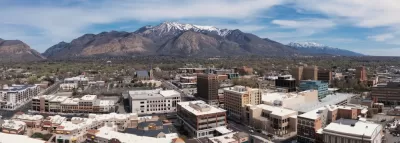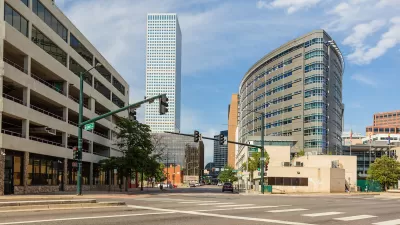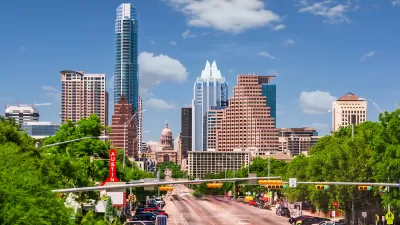A proposed state bill would bar cities from requiring parking in areas adjacent to transit stations in an effort to make housing production more affordable and encourage walking and transit use.

“In what has become a trend in large metro areas, the Utah Legislature is preparing a bill that would prevent cities from requiring parking in new housing and commercial buildings near transit stations.” Tim Fitzpatrick covers the story for the Salt Lake Tribune.
The bill, proposed by Rep. Robert Spendlove, is aimed at creating “more walkable communities, more affordable housing and less government regulation” by reducing the cost of housing construction and allowing the market to allocate space in more effective ways. According to a report from Bike Utah, current parking requirements “often override consumer and business preferences in favor of wasteful and car-centric design, especially in locations well-served by public transit.”
Some Utah cities are already developing new policies thanks to HB462, a prior state affordability bill that requires cities to create development plans for areas surrounding transit stations. “Vineyard is also relying on another state initiative that allowed the city to create a “Housing, Transit Reinvestment Zone” around its Frontrunner station, which sits in undeveloped land that is expected to have thousands of residents in the coming years.”
As one local developer points out in the article, even if cities eliminate parking requirements, some major banks tie parking requirements to construction loans. But the new bill could pave the way to a shift in priorities that could ripple across industries.
FULL STORY: Less lots, more walks: Utah ‘parking reform’ bill could mean less parking near transit stations

Alabama: Trump Terminates Settlements for Black Communities Harmed By Raw Sewage
Trump deemed the landmark civil rights agreement “illegal DEI and environmental justice policy.”

Study: Maui’s Plan to Convert Vacation Rentals to Long-Term Housing Could Cause Nearly $1 Billion Economic Loss
The plan would reduce visitor accommodation by 25% resulting in 1,900 jobs lost.

Why Should We Subsidize Public Transportation?
Many public transit agencies face financial stress due to rising costs, declining fare revenue, and declining subsidies. Transit advocates must provide a strong business case for increasing public transit funding.

Paris Bike Boom Leads to Steep Drop in Air Pollution
The French city’s air quality has improved dramatically in the past 20 years, coinciding with a growth in cycling.

Why Housing Costs More to Build in California Than in Texas
Hard costs like labor and materials combined with ‘soft’ costs such as permitting make building in the San Francisco Bay Area almost three times as costly as in Texas cities.

San Diego County Sees a Rise in Urban Coyotes
San Diego County experiences a rise in urban coyotes, as sightings become prevalent throughout its urban neighbourhoods and surrounding areas.
Urban Design for Planners 1: Software Tools
This six-course series explores essential urban design concepts using open source software and equips planners with the tools they need to participate fully in the urban design process.
Planning for Universal Design
Learn the tools for implementing Universal Design in planning regulations.
Smith Gee Studio
Alamo Area Metropolitan Planning Organization
City of Santa Clarita
Institute for Housing and Urban Development Studies (IHS)
City of Grandview
Harvard GSD Executive Education
Toledo-Lucas County Plan Commissions
Salt Lake City
NYU Wagner Graduate School of Public Service





























